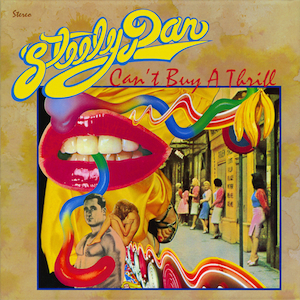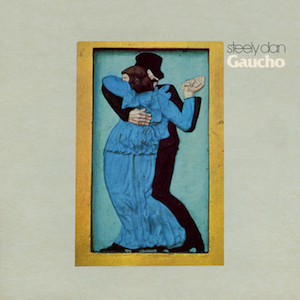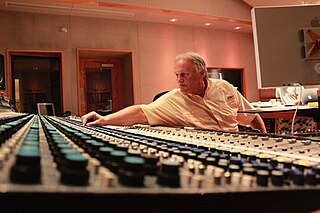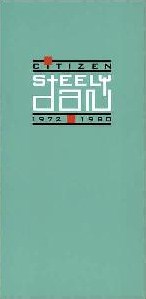
Steely Dan is an American rock band founded in 1971 at Bard College in Annandale-on-Hudson, New York by core members Walter Becker and Donald Fagen. Blending elements of rock, jazz, Latin music, R&B, blues and sophisticated studio production with cryptic and ironic lyrics, the band enjoyed critical and commercial success starting from the early 1970s until breaking up in 1981. Initially the band had a core lineup, but in 1974, Becker and Fagen retired the band from live performances altogether to become a studio-only band, opting to record with a revolving cast of session musicians. Rolling Stone has called them "the perfect musical antiheroes for the Seventies".

Pretzel Logic is the third studio album by American rock band Steely Dan, released on February 20, 1974, by ABC Records. It was written by principal band members Walter Becker and Donald Fagen, and recorded at The Village Recorder in West Los Angeles with producer Gary Katz. It was the final album to feature the full quintet lineup of Becker, Fagen, Denny Dias, Jim Hodder, and Jeff "Skunk" Baxter and also featured significant contributions from many prominent Los Angeles-based studio musicians and the last to be made and released while Steely Dan was still an active touring band.

Can't Buy a Thrill is the debut studio album by the American rock band Steely Dan, released in November 1972 by ABC Records. The album was written by band members Donald Fagen and Walter Becker, recorded in August 1972 at The Village Recorder in Los Angeles, and produced by Gary Katz. Its music features tight song structure and sounds from soft rock, folk rock, and pop, alongside philosophical, elliptical lyrics.

Aja is the sixth studio album by the American jazz rock band Steely Dan. It was released on September 23, 1977, by ABC Records. Recording alongside nearly 40 musicians, band leaders Donald Fagen and Walter Becker pushed Steely Dan further into experimenting with different combinations of session players while pursuing longer, more sophisticated compositions for the album.

Countdown to Ecstasy is the second studio album by the American rock band Steely Dan, released in July 1973 by ABC Records. It was recorded at Caribou Ranch in Nederland, Colorado, and at The Village Recorder in West Los Angeles, California. After the departure of vocalist David Palmer, the group recorded the album with Donald Fagen singing lead on every song.

Katy Lied is the fourth studio album by American rock band Steely Dan, released in 1975 by ABC Records. It was certified gold and peaked at No. 13 on the US charts. The single "Black Friday" charted at No. 37.

The Royal Scam is the fifth studio album by American rock band Steely Dan. It was produced by Gary Katz and was originally released by ABC Records in 1976. The Royal Scam features more prominent guitar work than the prior Steely Dan album, Katy Lied, which had been the first without founding guitarist Jeff Baxter. Guitarists on the recording include Walter Becker, Denny Dias, Larry Carlton, Elliott Randall and Dean Parks.

Gaucho is the seventh studio album by the American rock band Steely Dan, released on November 21, 1980, by MCA Records. The sessions for Gaucho represent the band's typical penchant for studio perfectionism and obsessive recording technique. To record the album, the band used at least 42 different musicians, spent over a year in the studio, and far exceeded the original monetary advance given by the record label. In 1982, the album won the Grammy Award for Best Engineered Non-Classical Recording and received Grammy nominations for Album of the Year and Best Pop Performance by a Duo or Group with Vocals.

Two Against Nature is the eighth studio album by American rock band Steely Dan. Their first studio album in 20 years, it was recorded from 1997 to 1999 and released on February 28, 2000, by Giant Records.

The Nightfly is the debut solo studio album by American singer-songwriter Donald Fagen. Produced by Gary Katz, it was released October 1, 1982, by Warner Bros. Records. Fagen was previously best known for his work in the group Steely Dan, with whom he enjoyed a successful career in the 1970s. The band separated in 1981, leading Fagen to pursue a solo career. Although The Nightfly includes a number of production staff and musicians who had played on Steely Dan records, it was Fagen's first release without longtime collaborator Walter Becker.
David Palmer is an American vocalist, songwriter, and photographer, best known as a former member of Steely Dan and as the lyricist of the Carole King number two hit, "Jazzman".

Daniel Joseph Levitin, FRSC is an American-Canadian cognitive psychologist, neuroscientist, writer, musician, and record producer. He is the author of four New York Times best-selling books.

Roger Scott Nichols was an American recording engineer, producer, and inventor.

Gary Katz is an American record producer, best known for his work on albums by Steely Dan. Katz has also produced numerous other recording artists and assisted in the discovery and signing of a number of subsequently successful acts.
Dennis Dias is an American guitarist, best known for being a founding member of Steely Dan.
The discography for the American jazz rock band Steely Dan consists of nine studio albums, 21 singles, two live albums, one live set on DVD, seven compilations in the United States, one box set, and numerous other appearances. The band has sold more than 40 million albums worldwide.

Citizen Steely Dan is a four-CD box set compilation album by Steely Dan, released in 1993. The set is a collection of all of Steely Dan's albums in chronological order, and also contains a non-album single, a non-album B-side, a rare compilation track recorded during the sessions for The Royal Scam but released only on the 1978 Greatest Hits, and a previously unreleased demo of "Everyone's Gone to the Movies".

Gold is a compilation album by Steely Dan, released in 1982. It mostly comprises hits both post-dating and not included on their 1978 Greatest Hits, essentially acting as "Volume 2"; it also features additional album tracks, offering a broad perspective on the band's career to that point.

"FM " is a song by American jazz-rock band Steely Dan, the title theme for the 1978 film FM. It made the US Top 40 that year when released as a single, a success relative to the film. Musically, it is a complex jazz-rock composition driven by its bass, guitar and piano parts, typical of the band's sound from this period; its lyrics look askance at the album-oriented rock format of many FM radio stations at that time, in contrast to the film's celebration of that medium.
"Aja" is a jazz rock song, with elements of jazz fusion and progressive rock, by the American rock band Steely Dan from the album of the same name, their sixth studio album, released in 1977. Composers Becker and Fagen play guitar and synthesizer, respectively, on the song, with various studio musicians playing the other parts; Fagen sings lead vocals. Production duties were handled by Gary Katz; the album was released through ABC Records. Musically, it is a tonally sophisticated and structurally complex work that was praised on its release as the most ambitious track the duo had ever attempted. The song's lyrics center around the interior monologue of a man who runs to the title character to escape the stresses of his life "up on the hill." Fagen claimed that it was inspired by a relative of someone he knew, who had married a Korean woman named Aja. He has described the song as being about the "tranquility that can come of a quiet relationship with a beautiful woman."
















